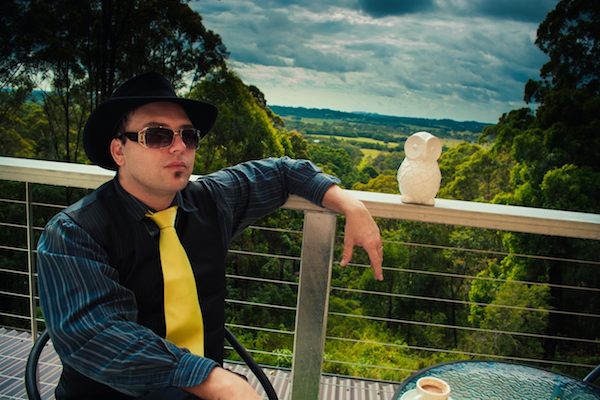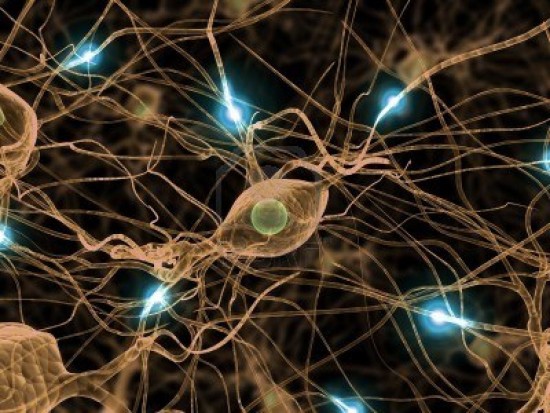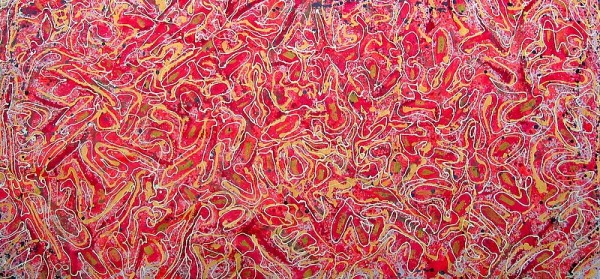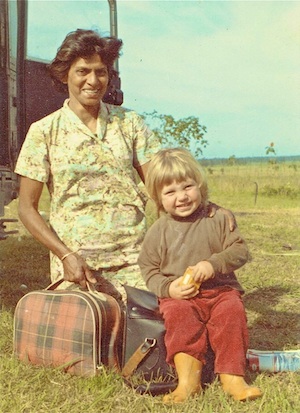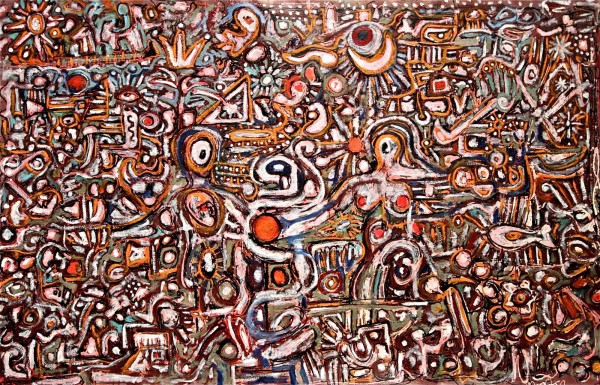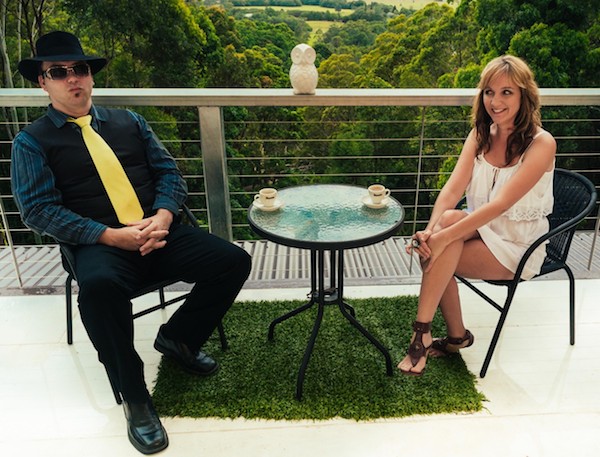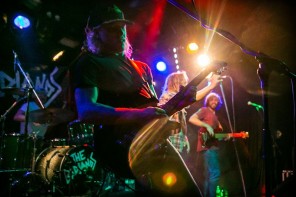When Mullumbimby-based Hamish Gordon, owner of PhatMajik studios, was bitten by a spider some years ago, his near-death experience changed his creative life forever he told Verandah Magazine.
Imagine this: you’re lying face down on the ground, naked. You’ve been bitten by something – you have no idea what. What you do know is, you’re dying. Your throat’s swollen so much you can’t even take a breath and you cannot move a single limb of your body. You were felled, crawling towards the telephone, which is only twenty metres from where you were bitten – and when you went down, it was like a bag of onions toppling off a chair. You’re trying to resist the black tunnel which is drawing you towards it, and yet at the same time, you know you can’t resist, its pull is too powerful.
And then, nothing. Nothing for how long? Hamish Gordon, artist, musician and writer will never know.
“It was probably only three or four minutes,” he says, “but at some point, I realised that I was taking these tiny breaths, that somehow my lungs were vibrating, even though my throat was constricted, they were just fluttering – which was bringing the tiniest amount of air into my body. I just lay there – out in the middle of nowhere – the bush all around me, and realised that a miracle had happened, and that I was still alive.”
For those of you who are wondering how and why someone is out in the middle of nowhere in the first place, Gordon had already lived a peripatetic and somewhat more than averagely exciting life, before all roads led him to that moment. To put it into context – a few years before, he had decided to leave the music industry in Sydney for the bush, and he’d bought himself a property in the Macleay Valley, forty minutes drive to the nearest general store, and two hours from Armidale, his nearest town.
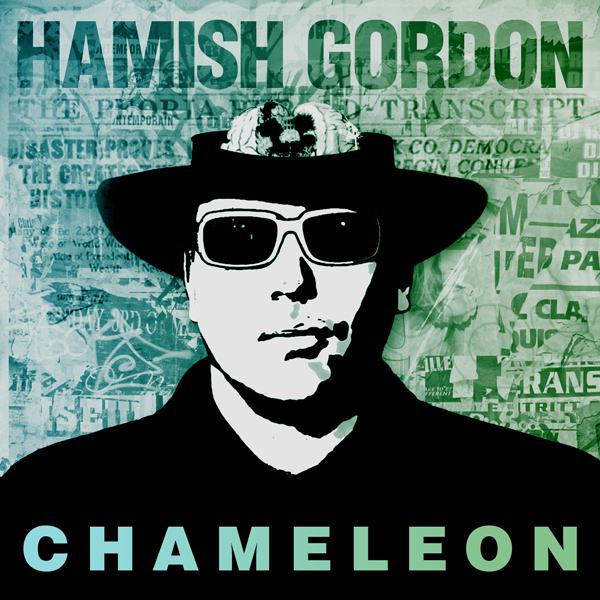
The cover of Hamish Gordon’s second album, Chameleon, was a reflection on the state of his brain after the ‘bite’.
“I organised this rather sweet deal where I agisted the property out to the guy I’d bought it from,” he says, talking to me in his current hilltop home near Byron Bay, which serves as family home, professional multimedia studio and artist’s quarters. “He paid me every month to let his cattle stay put, and I got enough from that to keep myself so I put a caravan on the property and had a whale of a time living out there, just me and the wilderness. I had a campfire every night, it took me a year to get the phone put on, I did these long walks for days and days up on mountain tops and ridges where people literally never go. I started painting again, and, most importantly for me, I finally had time to work on my books. That series of novels, the Carthian Chronicles, are my raison d’etre...”
After Gordon had finished a draft of what is now Book 3 in the series, he decided it was time to get someone with a neutral eye to read it. “It just so happened I knew someone up in Byron Bay. So I decided to hop in the troopy, drive to Byron, find him and get him to read it,” he says. “But when I eventually tracked him down, he was what I would call ‘scattered’, and after giving me a few excuses he finally told me to give it to this girl he knew. I dutifully went over to the address he’d given me. I opened her front gate, walked down her front path, saw her talking gibberish to a pot-plant, realised she was stoned out of her brain on magic mushrooms, turned around, opened the gate and left!”
Gordon decided to pursue one last option to get his book proofread, and called in at another Byron Bay address. “There was a different but equally strange party going on – and this time there was this really annoying guy there,” he says. “Someone introduced me to him, and he looked at me, and said, ‘wanna beer mate?’ I told him I’d given up the booze. Poking me in the chest, he lectured, ‘you don’t drink, you win’. After that, for the whole night, every time he saw me, he repeated the same phrase, ‘you don’t drink, you win’. Finally someone said to him, ‘Johnno, stop it, the poor guy gets it, alright? You don’t drink, you win’. But to tell you the truth I really didn’t mind him saying it! Anyway, at the end of it all, I thought, well, this is ridiculous, nobody in Byron Bay’s going to read my story and, frustrated with what appeared to be a totally wasted effort, I started the drive home.”
It was an extremely hot, long drive, and pulling over to fill up on petrol, Gordon noticed the garage had a bottle shop attached. “I thought to myself I’m parched, I’ll get myself a beer, bugger being on the wagon. Then suddenly Johnno floated in front of me saying: “you don’t drink, you win”. So I didn’t buy a beer, I drank a coke instead.”
That single, last-minute decision could well have saved his life. The doctor later told him that if he’d had any extra suppression on his nervous system, say from alcohol, he would have died.
By the time he got back to the caravan it was dark. “I was just doing my usual routine, barefoot as usual, and I trod on something sharp just outside the caravan,” he recalls. “I didn’t think much of it, I just thought it was a thorn – of which there were plenty – but after a while I started to feel drunk. I couldn’t keep my balance – I thought it was because of being hungry, so I got myself some soup. Then I was too weak to turn the can opener. It happened to be incredibly hot, and there were no neighbours, which is how come I was starkers. Suddenly, I’m there in the caravan, and I realised I was in big trouble, that I’d been bitten by something serious.”
His first thought was he was going to need help and he began to stagger to the shed where the phone was. “And that was it,” he says. “I went down like a sack of potatoes – clank, clunk, boof – and I thought ‘oh dear this feels like a nerve toxin’. I couldn’t breathe, my ears filled with this loud ringing note, and my field of vision became punctured by billions of dots. Everything went into slow motion, and all became clear. I realised, with horror, that any loved ones wondering where I was would look for me in Byron – and I saw in my mind’s eye this really graphic picture of what I would look like in three days when all the goannas and feral cats and wild dogs – and there were plenty of those about – had scattered my entrails all over the campsite.”
It wasn’t a pretty picture. “My thoughts turned bizarre,” Gordon says. “I kept thinking I haven’t published anything yet, I haven’t had an art exhibition, I haven’t put out any albums, I haven’t contributed anything to the planet, and then my body started going into convulsions. Then came the conflict. Part of me was saying ‘let’s fight this and live’, and the other part was saying ‘if you’re going to die you may as well relax’. Then I saw this huge black tunnel opening up, and I couldn’t help it – I just fell forward, and passed out into a patch of stinging nettles.”
And there was the second miracle. As he fell, Gordon’s tongue came out, and landed directly on the nettles. “The doctor told me later that the nerve stimulant from the nettles may well have jump-started me back up again!” he says. “It was incredible, really.”
The official wisdom is that he was probably only unconscious for three or four minutes, and that any longer would have caused brain damage. “I just came to and lay there, and it was as if my lungs were working independently. I was still completely paralysed, but they were sort of vibrating, which was drawing in enough air to keep me alive, and as I lay there I found first I was taking in an eighth of a breath, then a quarter, then half, then a full breath – and that,” he says, his face lighting up even now at the memory, “was just a joy. I started breathing again, and within ten minutes I could walk around.”
He managed to call the ambulance, get himself onto his bed, and collapsed again, to be woken by a paramedic shining a pinlight into his eyes. “They took me all the way to Kemspey Hospital, the doctor told me that if it hadn’t been for not drinking the beer, and the nettles I’d have been dead. They kept me in overnight and kicked me out the next morning, and then tried to charge me $900 for the ambulance ride… and that nearly did kill me!”
“Somewhere in there I’m part Maori too. So it explains why I love being an artist, love coconuts and occasionally want to chop people’s heads off.”
Sitting by the side of the road, with no money, borrowed clothes and no phone and no way to get home, Gordon was rescued by his part-time girlfriend of the time. He went to convalesce on her property, and his already bizarre story became even more bizarre. “I began to get better, I got back to my normal levels of being ‘better’, or ‘good’ and I just kept on getting better,” he says. “It was like Spiderman! Like some funny little plug had been pulled out somewhere. First noticing I’d become ambidextrous – that I could paint and write with my left hand, then I’d go out for a walk and write a dozen songs on the way. And to top it off I started doing maths!” He says this with an almost reverent tone, since Gordon was not, and never has been, mathematically gifted. “I got an ‘E’ in maths,” he says. “I was terrible at it! I stopped doing it in 4th form, and yet here I was coming up with these equations..”
And not just mental arithmetic. Between 2004 and now Gordon has written ten albums of song material, painted around 200 canvases, written a “couple of books”, part of his nine-part series of allegorical fantasy novels, the Carthian Chronicles, built a house, multimedia recording studio and sound-stage, plus settled down with a permanent partner, Sara, and her two children.
Perhaps even more curious than this story is the fact that this was not the only occasion death came knocking. Long before the miraculous escape of 2004, there was another one, many years before. Born in Sydney to documentary film-maker and adventurer Keith Adam and his wife Judy, a Professor of Archaeology at Sydney University, Gordon experienced a restless, nomadic lifestyle, moving wherever his parents’ work took them. “We lived in Tibet, Nepal, India, Thailand, England and Japan,” he says. “We were even guests of the Maharajah of Jaipur, who gave me this little shiny blue mini-maharaja suit I used to put on when I wanted to resist authority.”
When Gordon was five, he and his parents were on their way to Lakdakh, flying over the Himalayas in a jumbo jet, when Gordon glanced out of the window to see what he years later realised was a surface-to-air missile going past the plane! “It was about a metre long,” he says. “I can still see the khaki and tan blots, you know, the camouflage paint-job on it, and it just flew slowly under our wing, overtaking us. First I thought it was a bird. But it had a trail coming out of the back, and a pointed nose and wings and it was metal. I remember I pointed at it, and said ‘Mum, there’s another tiny plane out there.’ She said to me, ‘don’t be silly darling’, and that was that. Nobody really reacted – other than a few gasps. But I guess it was some group of crazies that had just bought themselves a new rocket launcher from the Russians and were taking a pot shot at the nearest plane to see if it worked!”
It was an exciting life for a five-year-old. “We had this retinue of camels, elephants, horses, mules, donkeys, guides not to mention bags of cameras and sound equipment,” Gordon says. “I remember one of the guys in the retinue, ‘Mad Mohammed,’ we called him – the fervour of Allah would get into him at all sorts of odd times, and he had a bit of a short fuse. Once we had to stay dead still for hours on a jungle path in the middle of the night while a huge, grazing bull elephant blocked our way, because every time the elephant got annoyed he started to charge this little tin box of a car we were in. Finally Mohamed completely lost the plot and started wailing and shouting at the elephant and sounding the horn, and my mother was saying, ‘oh Mohamed don’t – stop it’ and my father was hissing ‘shut up you fool!’. There was pandemonium for a while.”
Another night while his mother and he were sleeping in their tent, someone came in and stole their Nikon camera. “My mother was furious,” he says. “She packed up our whole travelling circus and we went to the nearest police station. There was a guy with a rusty old blunderbuss at the top of the steps, standing to attention like he was Rambo with M60, and the Chief of Police in all his glory was lying asleep on an empty desk at eleven in the morning. So my mother comes in and whacked the desk and he woke up with this bleary look. She told him: ‘Someone’s stolen my camera’, and this look of total horror crossed his face. ‘I didn’t!’, he says. ‘It wasn’t me!’
Gordon laughs as he recollects, “The Chief of Police actually thinks we’re accusing him personally. You can’t write it. India is just like a Charlie Chaplin movie with unlimited extras.”
But this wasn’t the end of the episode. Just as his mother (a resourceful and forceful figure if ever there was one) was beginning to realize they weren’t getting anywhere, they spotted a man running away from the police. “We were out the front of the police station, just standing watching while this fugitive comes running like the wind, leaps onto a tiny tiny motorbike and he takes off at about one mph. Then here come the cops, all having this huge argument while this guy is escaping at one mile an hour. One of them levelled his rifle to shoot the escapee, but the rifle blows up in his face. He goes down. The others keep arguing, and this guys eventually escapes at walking speed, due to incompetence, possibly with our camera.”
This somewhat abnormal life for a small child ended when the family went to live in Sydney when Gordon was eight, and he was booked into Cranbrook private boys school. “It was a good school,” he says. “But I didn’t respond well, although I eventually got into music and art. I always wanted to be an artist – there was never any doubt that I was going to be anything other than an artist. But I found school very tough.”
Gordon’s forceful (and funny) personality is matched by his physical size, which he attributes to bizarre ancestry. “My Dad’s family is Scottish. My mother, although she was born in England is part Sicilian. And somewhere in there I’m part Maori too. So it explains why I love being an artist, love coconuts and occasionally want to chop people’s heads off.” He gazes off into the distance for a moment over the top of the highly sophisticated sound-deck he’s installed in his recording studio. “I have this strange ancestral pull to go and live in the South Pacific,” he says, “but Mullumbimby can suffice in the meantime”. Sometimes, he admits, he feels that the spider experience somehow altered him forever internally. “It was Dryden who said ‘there is pleasure pure in being mad that none but madmen know’, and I understand that phrase,” he says. “It resonates.”
When Gordon had finished school, he went to the school of Creative arts in Wollongong where he did Prose Fiction, Jazz, Arts Journalism, Painting and Film Theory. Back in Sydney he played in a few bands, before opening his first recording studio, Arcadia Sound in Bondi. He and his partner of the time had a son, but gradually the music lifestyle began to get to him.
“The music industry had really sucked me dry,” he says. “I was drinking too much, and owning the recording studio I’d began to lose my own artistic identity, and that was when I decided it was time to get out of the city. Never one to do things by halves, I sold up and moved into a caravan in the middle of absolute nowhere. Which of course is where the best stuff always happens.”
It was a few years after his spider bite while he was searching for a producer to help him mix his own growing pile of song material that he chanced across veteran producer Steve James, of Byron Bay’s Rocking Horse studio. “Steve had worked with Monty Python, Thin LIzzy, Cold Chisel, the Screaming Jets, so I was well impressed. He and I got on so well, I could see him doing all my stuff,” he says, “so I sold the place in the Macleay Valley, bought up here, put the studio up and now Steve and I are a production team.”
Also at some point in there came a name change. Hamish Gordon is not his real name, it’s an amalgamation of two Scottish names. “Somebody hacked into my original website and stole a whole heap of stuff,” he says, “and I’m just a bit paranoid about having my real identity out there on the web, so I invented Hamish Gordon to be my public face.”
Gordon met Sara Signal, a beauty therapist, in 2011, and life began to take on a more settled meaning. “Sara moved in with her two mad boys,” he says, “and things turned sane again. My own son comes up for the holidays. I write, and paint, and make music and record for other people, and life is good – I sometimes think of Johnno, and what he kept saying – ‘you don’t drink, you win’. Was he completely off his head? Or did he see something around me? I guess I’ll never know, but I’m glad to be here.”
He pauses. “I never did get that draft proof-read though.”
Candida Baker
You can contact Hamish Gordon on PhatMajik Studios at: phatmajikentertainment For his art, go to livingwallcustomcreations

